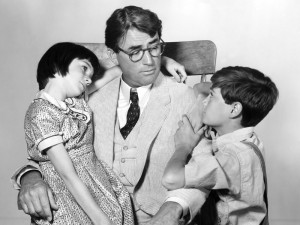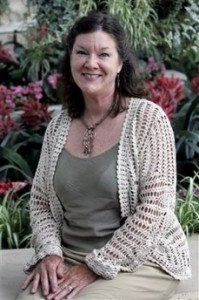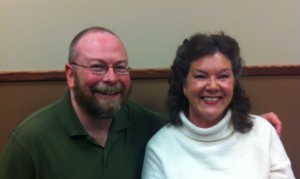Legendary actress Mary Badham could not talk when I first called her for an interview.
“My dog Daisy, a rescue animal I got a few weeks ago, is lost and I have to go look for her,” she said as she was hurrying to her car.
 Badham, 61, is best known for playing “Scout” in To Kill a Mockingbird, the very first film role for the 10-year-old, which earned her an Academy Award nomination.
Badham, 61, is best known for playing “Scout” in To Kill a Mockingbird, the very first film role for the 10-year-old, which earned her an Academy Award nomination.
The movie has become a timeless statement on small town justice and the evils of prejudice and blind hatred. Over 50 years later, it seems Badham is still a champion for the…well, the “underdog.”
“The neighbor had her,” she breathed with a sigh of relief when calling me back.
On Thursday, the actress appeared at The Wildey Theatre in Edwardsville to speak to the audience, answer questions, and sign autographs at a special screening of the 1963 film that made her a star.
A Southern Gothic novel set in Alabama in the 1930s, To Kill a Mockingbird exposed the racial inequalities and fear born of ignorance that results in man’s inhumanity to man. The film version, also starring Gregory Peck and Robert Duvall (his film debut), is widely considered one of the greatest films of all time and is shown to this day in schools, universities, and libraries as a teaching tool.
“It is such an important and beautiful piece of work,” Badham said. “It addresses problems and lessons we have not learned yet. Ignorance is the root of all evil, and this is not just a 1930s black and white film. This is here, this is today. Whenever you have ignorance, you have bigotry.”
The actress is more passionate about the film than ever, as she says its message is needed even more today than it was 50 years ago.
“There will always be people like those in the movie making life difficult for others,” she said. “Look at the horrific events just this past week.
“This stuff literally is here slapping us in the face every single day. That keeps me going, keeps me talking about this film and these issues.”
 Badham portrayed Jean Louise “Scout” Finch, the daughter of a small town lawyer (Peck) who defends a black man falsely accused of rape. Through the children in the film, the “Mayberry” charm of life in the South is grossly contrasted with evil tolerated as “just the way it is.”
Badham portrayed Jean Louise “Scout” Finch, the daughter of a small town lawyer (Peck) who defends a black man falsely accused of rape. Through the children in the film, the “Mayberry” charm of life in the South is grossly contrasted with evil tolerated as “just the way it is.”
Through Badham’s performance, Scout almost single-handedly challenged the town’s social structure. The character also bucks the trend of proper young ladies of the time period, as Scout is more comfortable wearing overalls and getting into scraps with boys.
“I was a tomboy,” Badham said. “That was one of the reasons I was picked for the role. They wanted a true Southern tomboy with a good imagination, and that was me.”
The mockingbird is portrayed in the book and film as something wholesome and innocent. In her very first acting role (in fact, by the age of 9, she had never even seen a movie), Badham almost eerily portrays an innocent and trusting young girl at the beginning of the film, and a darker, knowing soul by the end credits.
A premiere in Birmingham, Ala., was the first time she saw the entire movie put together.
“I had no idea of the impact,” she said. “I really wasn’t even aware what was going on. Put yourself back in that time period. We had one little black and white television and only got two stations at certain times of the day. I was preoccupied with playing outside and reading when it rained. Most people now are too young to understand that.”
Over the years, Badham stayed close with the cast and crew, Peck in particular, and the two remained friends until his death in 2003. Following a few more acting roles (including the final episode of The Twilight Zone in 1964), the girl who set a record as the youngest actor ever nominated for Best Supporting Actress walked away from the profession.
“Acting was not something I had chosen to do; it was something that happened to me,” she said. “As I got older, the industry was changing dramatically. There was too much sex, drugs and rock and roll in movies by the 70s, and strong family values were missing. I decided I didn’t want to be a part of what was being put out there.”

Today, the wife of 40 years, mother of two, grandmother of three, painter, art restorer, and champion of causes travels the country, attending screenings of To Kill a Mockingbird and speaking to young people about its virtues and example.
“Using this film to educate children is so important,” she said. “Talking about these issues will help raise a generation that is tolerant and will make this world a nicer place to live. I go to inner city schools that are hurting for money, hurting for teachers, and hurting for books. I tell these kids to go to the library and study and read anything and everything they can get their hands on.
“That includes the book To Kill a Mockingbird. All of life’s lessons are in there.”
As she speaks so passionately, it is easy to see why, while other characters in To Kill a Mockingbird represent conscience and justice, Badham’s performance truly is the movie’s heart.


